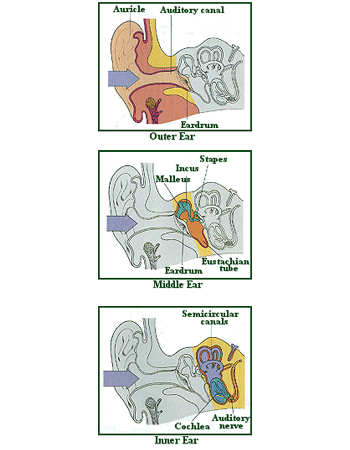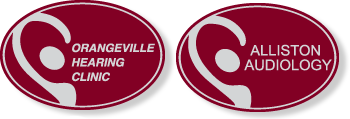Hearing Loss
Hearing Loss in Adults | Signs of Hearing Loss in Adults | Hearing Loss in Children | Signs of Hearing Loss in Children | How We Hear | Types of Hearing Loss | Protect Your Hearing | Getting Help | Checking for Hearing Loss
Hearing Loss in Adults
 Do you:
Do you:
- Frequently ask people to repeat themselves?
- Feel that people mumble or fail to speak clearly?
- Turn up the volume on your T.V. or radio louder than others prefer?
- Avoid social situations?
- Feel anxious going to a social engagement because of possible communication difficulty?
- Have difficulty following conversations in a room with background noise?
- Often misunderstand what people say?
These problems affect everyone at one time or another. However, if you are frequently experiencing difficulty, you may have a hearing loss. Our goal is to invest the time needed to thoroughly address your concerns by working with you to evaluate your personal goals and lifestyle. We work with you as a team to address your hearing healthcare needs.
Signs of Hearing Loss in Adults
Because hearing loss can develop over several years, most people are not aware of the extent of their hearing loss until family or friends bring it to their attention. Even then, the problem is often ignored or explained with excuses such as fatigue or “people are mumbling”.
Recognizing a hearing loss in yourself or someone you know is the first step toward improving the situation.
Signs of hearing loss include:
- Asking others to repeat themselves
- Misinterpreting a spoken message
- Turning up the volume levels on the television or radio
- Difficulty hearing on the telephone
- Difficulty hearing in public gatherings, e.g. concert halls, theaters, houses of worship or where sound sources are far from the listener
- Difficulty understanding conversation within a group of people
- Avoiding group situations, where listening may be difficult or where one may feel embarrassed about misunderstanding what is being said
Hearing Loss in Children
 Normal hearing is essential for many aspects of your child’s growth including:
Normal hearing is essential for many aspects of your child’s growth including:
- Social skills
- Brain development
- Speech and language development
- Learning abilities
As part of our commitment to children, we provide services for the Infant Hearing Program (IHP) of Ontario. The government-funded program designed to detect and help hearing loss as early as possible. Through thorough evaluation and intervention, Orangeville Hearing Clinic and Alliston Audiology will work with you and your child to help them reach their full potential.
Signs of Hearing Loss in Children
 Young Children will often not be aware of changes / deficiencies in their hearing. They don’t have the same experience with hearing the world and therefore don’t have an accurate knowledge of what we are supposed to hear.
Young Children will often not be aware of changes / deficiencies in their hearing. They don’t have the same experience with hearing the world and therefore don’t have an accurate knowledge of what we are supposed to hear.
Signs of hearing loss in children include:
- Frequent requests for repetition
- Difficulties learning in school
- Delayed speech and language development
- Frequent ear infections
- Syndromes or illnesses such as Down’s Syndrome and other cranial facial malformations, cancer and kidney disease
- Short attention span
How We Hear
 Better understanding of hearing and hearing loss begins by understanding how we hear.
Better understanding of hearing and hearing loss begins by understanding how we hear.
Sound waves are collected by the outer ear and channeled along the ear canal to the eardrum. When sound hits the eardrum, the impact creates vibrations which, in turn, cause three bones in the middle ear to move. The smallest of these bones, the stapes, fits into the oval window between the middle and inner ear. When the oval window vibrates, fluid in the inner ear transmits the vibrations into the hearing organ, called the cochlea.
In the inner ear, thousands of microscopic hair cells are bent by the wave-like action of fluid inside the cochlea. The bending of these hairs sets off nerve impulses which are then passed through the auditory nerve to the hearing center of the brain. This center translates the impulses into sounds the brain can recognize.
Types of Hearing Loss
There are three types of hearing loss: conductive, sensorineural, and mixed.
A conductive hearing loss occurs when sound is not conducted efficiently through the ear canal, eardrum or middle ear. For example ear infections and otosclerosis can cause conductive hearing loss.
A sensorineural hearing loss occurs when there is damage to the inner ear or auditory nerve.
Damage can be caused by:
- The natural aging process
- Exposure to loud or constant noise
- Ototoxic medications
- Illness or birth defects
- Hereditary
- Traumatic injury
A sensorineural hearing loss is typically a permanent type of hearing loss that usually can be helped with hearing aids.
A mixed hearing loss occurs when someone has a combination of a sensorineural hearing loss and a conductive hearing loss.
Protect Your Hearing
 In today’s technologically advanced world, hazardous noise levels have become part of our daily life. Off the job, our hearing is assaulted by noise from traffic, construction and lawnmowers.
In today’s technologically advanced world, hazardous noise levels have become part of our daily life. Off the job, our hearing is assaulted by noise from traffic, construction and lawnmowers.
On the job, noise is generated by office or industrial equipment, machinery and power tools. Even recreational activities such as hunting, snowmobiling and listening to loud music can affect your hearing.
Protect your hearing because it’s irreplaceable. Avoid harmful noise levels. If you have to shout to be heard or if speech sounds muffled after leaving a noisy area, then the level is too high. It is recommended that hearing protection be worn in noisy situations at home and on the job. Earplugs or earmuffs are available from your Audiologist and provide good protection.
Getting Help
If you have any questions regarding hearing, testing for hearing loss, or hearing aids, please contact us at Orangeville Hearing Clinic and Alliston Audiology.
Checking for Hearing Loss
Three types of hearing checks are available: Comprehensive Assessment, Basic Test and Hearing Screening. We recommend a Comprehensive Assessment. Basic testing has been available and unchanged since the 1980s and is not recommended. Hearing Screening can determine if a comprehensive assessment is warranted.
Comprehensive Assessment
Your audiologist will select the relevant tests which may include video inspection of the ear (video otoscopy), eardrum movement testing (tympanometry and middle ear muscle reflex testing), inner ear hair cell testing (otoacoustic emission test), puretone and speech testing (audiometry), high frequency audiometry (9000 to 16000 Hz for chemotherapy, radiation therapy monitoring), speech-in-noise testing, tinnitus testing (tinnitus matching), and others.
Basic Test
Puretone and speech testing (audiometry), looking into your ear (otoscopy), eardrum movement testing (tympanometry).
Screening
Hearing screenings are generally performed at work or in the community and generally use a pass/fail criteria. For example, if your hearing level was lower than a set level, you would be referred for a comprehensive assessment.
It is recommended that people over fifty years of age get their hearing checked regularly. Orangeville Hearing Clinic and Alliston Audiology are there to work with you through this process.
Schedule an Appointment
With our advanced products and services, we'll find the right fit for your hearing needs!
Doctors Needing Referral
To doctors who need patient referrals, please click the button below.
Orangeville Hearing Clinic
Orangeville Medical and Professional Building
15 Elizabeth St., Suite M11
Orangeville, ON
L9W 3X3
Alliston Audiology
Windsor House, P.O. Box 99,
36 Victoria St. West, Unit 1
Alliston, ON
L9R 1V5
Alliston Audiology
36 Victoria St. West, Unit 1, Alliston, Ontario L9R 1V5
(705) 435-2133
Serving: Orangeville, Shelburne, Caledon, Caledon East, Erin, Hillsburgh, Grand Valley, Alliston, Angus, Tottenham, Beeton, Cookstown, Alton
